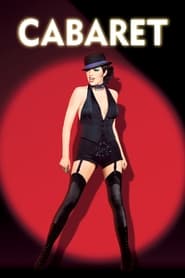Cabaret's central theme is the psychosexual heart of fascism, illustrating the way it offers "an array of machismo-for-rent that had (and has) a special appeal to some kinds of impotent people". That is to say, it is a welcome corrective after decades of dusty analysis focusing only on Wehrmacht tank battles, the perspective of the United States or the sexual dimension of Nazism being described only through sublimated proxies such as their uniforms. Not unrelatedly, I admire how the (often darkly chilling) Nazi stuff is kept at a meaningful distance from the main plot mechanics, thus underscoring that the escapist fantasy of the Kit Kat Club is just that: a fantasy.
Fosse’s genius stroke was to completely sever the movie’s musical numbers from the central story, opting instead to have them offer direct comment on the surrounding action. [The] strategy is a deliberate rejection of standard movie-musical tropes, and the effect simultaneously roots the production numbers in realism while still using them to add one further layer of critical distance from the surrounding material. In Cabaret, which peers flawlessly into the past, the present, and the future, escapism offers escape only in so far as it offsets what should be obvious. Until it can’t anymore, and by then it’s too late.
— Eric Henderson (Slant Magazine)
Here the festivities are overseen by a master of ceremonies [w]hose determination to keep the merriment going, at whatever psychic cost, has a poignant compulsiveness. When the song Cabaret comes at the end, you realize for the first time that it isn't a song of happiness, but of desperation. The context makes the difference. In the same way, the context of Germany on the eve of the Nazi ascent to power makes the entire musical into an unforgettable cry of despair.
Minnelli won a well-deserved Best Actress Oscar for her melancholy performance[,] while Joel Grey’s work as a sexually ambiguous emcee won Best Supporting Actor and [Bob] Fosse won Best Director. Those last two stick in the craws of many cinephiles, given the people they beat (Al Pacino and Francis Ford Coppola for The Godfather), but Cabaret is no safe alternate.[…]
Fosse and cinematographer Geoffrey Unsworth light the Kit Kat Klub in a way that makes it a seedy little sanctuary, one that can’t fully disguise that there’s something terribly wrong in Berlin, but it’s easy to distract yourself with all of the beautiful women onstage.
— Max O'Connell (IndieWire)
[D]renched in the sexiest kind of cynicism and decadent despair: it is Nero's fiddle, scraping and squawking in the 20th century. [A] thrilling indictment of evil's specious and banal glamour, and of foreigners' feeble and prurient and uncomprehending attitude to the growing European threat. Most of all it is a deeply pessimistic indictment of satire itself, a type of comedy that emerges as fatally ambiguous and parasitic, unable to make any real difference to what it is supposedly attacking. Is the Weimar cabaret scene an assault on Nazism? Or Nazism's minor symptom?The film belongs to Liza Minnelli, whose poignant vulnerability is a counterweight to all the grim cynicism. Her saucer-eyed prettiness is almost shocking amid the squalor, and her voice is fascinating. [What] on Earth happens to this American expatriate after the story is over and war is declared? What awful fate is in store for this strange innocent? This unanswered question hangs over the end of the film after the final chords have died away.
— Peter Bradshaw (Cabaret)
[Sally was Christopher] Isherwood’s own boy-girl alter ego, his female double, enthusiastically sleeping her way to nowhere. Casting his alter ego as a girl had the advantage of neutralising his own sexual transgressions since any bad girl was, in the 1930s, far more shocking than any bad boy. As a woman, Sally is far more ‘lost’ than the Isherwood character, and the Isherwood character can even masquerade as her protector.
— Katherine Bucknell: Christopher Isherwood: Inside Out

